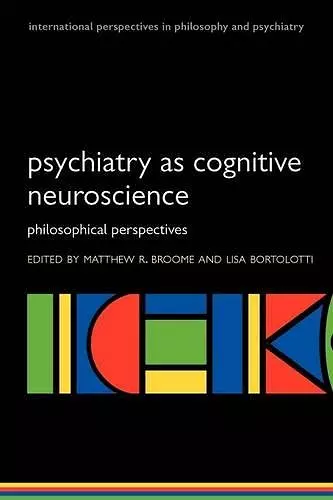Psychiatry as Cognitive Neuroscience
Philosophical perspectives
Lisa Bortolotti editor Matthew Broome editor
Format:Paperback
Publisher:Oxford University Press
Published:14th May '09
Currently unavailable, and unfortunately no date known when it will be back

One of the Guardian's Best Books of 2009
Psychiatry as Cognitive Neuroscience is a philosophical analysis of the role of neuroscience in the study of psychopathology. The book examines numerous cognitive neuroscientific methods, such as neuroimaging and the use of neuropsychological models, in the context of a variety of psychiatric disorders, including depression, schizophrenia, dependence syndrome, and personality disorders.Neuroscience has long had an impact on the field of psychiatry, and over the last two decades, with the advent of cognitive neuroscience and functional neuroimaging, that influence has been most pronounced. However, many question whether psychopathology can be understood by relying on neuroscience alone, and highlight some of the perceived limits to the way in which neuroscience informs psychiatry. Psychiatry as Cognitive Neuroscience is a philosophical analysis of the role of neuroscience in the study of psychopathology. The book examines numerous cognitive neuroscientific methods, such as neuroimaging and the use of neuropsychological models, in the context of a variety of psychiatric disorders, including depression, schizophrenia, dependence syndrome, and personality disorders. Psychiatry as Cognitive Neuroscience includes chapters on the nature of psychiatry as a science; the compatibility of the accounts of mental illness derived from neuroscience, information-processing, and folk psychology; the nature of mental illness; the impact of methods such as fMRI, neuropsychology, and neurochemistry, on psychiatry; the relationship between phenomenological accounts of mental illness and those provided by naturalistic explanations; the status of delusions and the continuity between delusions and ordinary beliefs; the interplay between clinical and empirical findings in psychopathology and issues in moral psychology and ethics. With contributions from world class experts in philosophy and cognitive science, this book will be essential reading for those who have an interest in the importance and the limitations of cognitive neuroscience as an aid to understanding mental illness.
'The book that has interested me most this year has the rebarbative title Psychiatry as Cognitive Neuroscience: Philosophical Perspectives, edited by Matthew R Broome and Lisa Bortolotti (Oxford University Press). It is a collection of very varied essays on subjects such as the nature of mental illness, whether psychiatry is a science, and why so-called personality disorder can't be treated, all matters of great interest in themselves, but also of relevance to criminal law and sentencing policy. Despite its title, it is a gripping read.' - Mary Warnock, writing in the Observer (2009)
'Matthew Broome and Lisa Bortolotti have assembled a stellar cast of contributors to this volume. They bring together philosophy and neuroscience in an attempt to give an account of psychopathology that is more detailed and penetrating than the standard descriptions and definitions. The quality of the writing and analysis is uniformly excellent without becoming inaccessible to a clinical readership. The combination of rigorous conceptual analysis and neuroscience will take psychiatry in new directions in future years.' - The British Journal of Psychiatry
...an outstanding summary of the contemporary issues in the study of the mind, brain and phenomenology... This is an _ excellent entree for readers interested in the importance of understanding behavior and psychopathology scientifically._ It is essential reading for those involved in the understanding of mind and brain.' * Doody's Notes *
Written and edited by a group of internationally recognized researchers on the cognitive neuroscience of psychopathology, this book is an outstanding summary of the contemporary issues in the study of mind, brain, and phenomenology. [...] It is an essential reading for those involved in the understanding of mind and brain. * MJ Schrift, Occupational Medicine 59 *
ISBN: 9780199238033
Dimensions: 233mm x 156mm x 23mm
Weight: 576g
400 pages